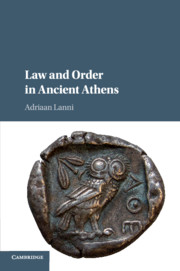Book contents
- Frontmatter
- Dedication
- Contents
- Acknowledgments
- List of Abbreviations
- Introduction: The Puzzle of Athenian Order
- PART ONE
- PART TWO
- THREE The Expressive Eff ect of Statutes
- FOUR Enforcing Norms in Court
- FIVE Court Argument and the Shaping of Norms
- SIX Transitional Justice in Athens: Law, Courts, and Norms
- Conclusion
- Bibliography
- Index
SIX - Transitional Justice in Athens: Law, Courts, and Norms
from PART TWO
Published online by Cambridge University Press: 05 August 2016
- Frontmatter
- Dedication
- Contents
- Acknowledgments
- List of Abbreviations
- Introduction: The Puzzle of Athenian Order
- PART ONE
- PART TWO
- THREE The Expressive Eff ect of Statutes
- FOUR Enforcing Norms in Court
- FIVE Court Argument and the Shaping of Norms
- SIX Transitional Justice in Athens: Law, Courts, and Norms
- Conclusion
- Bibliography
- Index
Summary
Thucydides famously describes how Corcyra and other Greek cities were convulsed by civil wars between oligarchic and democratic factions during the Peloponnesian War, leading to a complete breakdown of civil society. Violence and mistrust spiraled out of control with no end in sight:
Revenge was dearer than self-preservation…. An attitude of suspicious antagonism prevailed; for there was no word binding enough, no oath terrible enough to reconcile enemies. Each man had concluded that it was hopeless to expect a permanent settlement….
Toward the end of the war, Athens experienced a civil war marked by horrific violence: in an eight-month period at the end of the fifth century, an oligarchic coup resulted in the killings of between 5 and 10 percent of the citizenry and the expulsion, by some accounts, of more than half its population. But unlike other Greek states, Athens pulled itself back from the brink. When the oligarchy was overthrown, an amnesty was instituted for all but the top officials in the former regime, and the restored democracy endured without significant internal threat until Athens was conquered by Philip of Macedon in 338 BCE. The Athenian reconciliation was admired throughout Greece for its success in avoiding the cycle of revolution and counterrevolution that afflicted other cities.
This chapter describes how Athens’ legal institutions helped restore order after the civil war. The civil war, the reconciliation agreement, and the rhetorical echoes of these events in Attic oratory have been extensively studied. The goal of this chapter is not to provide a comprehensive account of why the reconciliation succeeded. Rather, I want to present the Athenian reconciliation as a single episode that illustrates the various ways in which the courts maintained order in the absence of a rule of law that we have been exploring in the previous chapters. That is, the Athenian response to civil war demonstrates how Athenian courts fostered order and a peaceful transition, though not through the familiar Austinian mechanism of imposing sanctions for violating statutes.
To a modern, this may not seem surprising. Modern transitional justice mechanisms typically take the form of special war crimes tribunals, truth and reconciliation commissions, and administrative justice procedures that disqualify those involved in the former regime from public office or employment.
- Type
- Chapter
- Information
- Law and Order in Ancient Athens , pp. 171 - 199Publisher: Cambridge University PressPrint publication year: 2016



